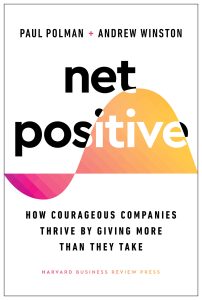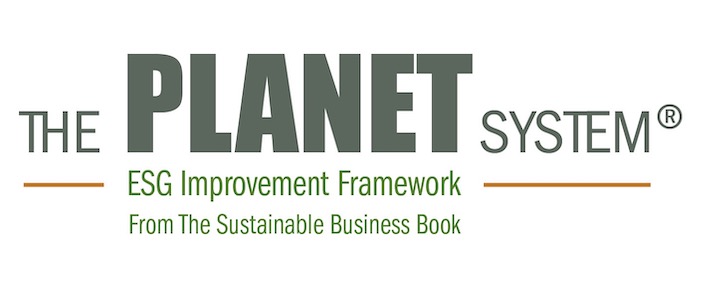 Net Positive – Polman & Winston
Net Positive – Polman & Winston
The one sentence summary: Courageous companies thrive by giving more than they take.
WHAT THE BOOK SAYS
- Runaway climate change and rampant inequality are ravaging the world and costing a fortune. Business can help lead us to a better future by stepping up and doing what governments cannot do alone.
- This book aims to explode 50 years of corporate dogma by showing how Unilever and other pioneering companies have profited by fixing the world’s problems instead of creating them. To do this, they need to become net positive – giving more to the world than they take.
- A net positive company improves the lives of everyone it touches, takes ownership of all the social and environmental impacts its business model creates, and partners with competitors, civil society and governments to drive transformative change that no single group or enterprise could deliver alone.
- Our current economic system has two fundamental weaknesses: it’s based on unlimited growth on a finite planet, and it benefits a small number of people, not everyone. The ultimate question is: Is the world better off because your business is in it? Fundamental principles include:
- You break the world, you own it (just like an item in a shop)
- You need to care, and be courageous
- Unlock the company’s soul (discover organizational and employee purpose and passion – go back to their roots to understand original purpose)
- Blow up boundaries (by thinking big and setting aggressive net positive goals – if a goal is not making you uncomfortable, it’s not aggressive enough. Achievable and Realistic elements of SMART objectives are therefore not good enough because they lack ambition.)
- Be an open book (by building trust and transparency)
- Create partnerships with synergies and multiplier effects: 1+1=11 (Companies should not be one-upping their competitors on shared challenges – they should be precompetitive so that the whole category wins)
- Embrace the elephants (manage issues that no one wants to talk about, such as paying taxes, corruption, overpaying executives, human rights, lobbying etc.)
- Put the values into action – deep in the organization and brands
- Be even more responsible for broader impacts (do more good), challenge consumption and growth, rethink measures of success such as GDP, improve social contracts, defend the pillars of society and pursue a higher moral ground)
OTHER INTERESTING POINTS
- Insurance company Swiss Re estimates that half of global GDP ($42 trillion) is at risk because it is dependent on high-functioning biodiversity.
- Companies are too short-term – the average duration of executive compensation plans is a shockingly low 1.7 years.
- Many investors are not your long-term friend – the average holding period of stocks has plummeted from 8 years in the middle of the 20th century to 5 months in 2020.
- Businesspeople have wilfully misunderstood Smith and Darwin. Darwin did not coin the phrase survival of the fittest, and Smith’s invisible hand in a free market was only a minor point.
- According to Ajay Banga, former Chairman of Mastercard, you need DQ – a decency quotient to care about the people around you.
- In the reverse goal challenge, you should reverse any goal you have and say it out loud. If to set a target to get to 60% renewables, you’re also committing to 40% energy with climate changing gases.
- Replace a negative footprint with a positive handprint – net positive.
- The Task Force on Climate-related Financial Disclosures (TCFD) encourages better reporting on these issues to increase accountability.





Leave A Comment
You must be logged in to post a comment.